Catalogue > Liste par artiste
Parcourez la liste complète des artistes présentés dans le cadre des Rencontres Internationales depuis 2004. Utilisez le filtre alphabétique pour affiner vos recherches.
Danièle Hibon
Catalogue : 2007Musée national du Jeu de Paume | 0 | 0 | | 0:0 | France | 2007
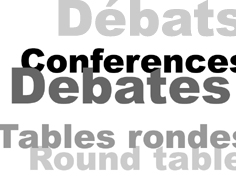
Danièle Hibon
Musée national du Jeu de Paume
0 | 0 | | 0:0 | France | 2007
A partir de 1991, la Galerie Nationale du Jeu de Paume devient un lieu d?exposition, un lieu d?apparition de l?art contemporain et de la photographie. Ce n?est qu?en 2004 que la Galerie Nationale du Jeu de Paume fusionnera avec le Centre National de la Photographie et avec le Patrimoine Photographique, résidant à l?Hôtel Sully dans le Marais. Depuis, les sites de la Galerie sont exclusivement dédiés à la photographie contemporaine, à la vidéo et au cinéma. Elle accueille les artistes du monde entier, privilégiant ainsi une approche synchronique des moments de l?histoire de l?art au travers, notamment, de la photographie et de ses émois, depuis sa création jusqu?à ses transformations contemporaines. L?image en tant qu?expression artistique s?y meut et s?y révèle dans la diversité de ses modes d?apparitions. Soucieuse d?accroître ses publics, la Galerie Nationale du Jeu de Paume configure ses expositions comme des sources de connaissance et organise des projections pédagogiques, des colloques et des conférences. De l?exposition "Support/Surface" bricolant avec le fonctionnel à travers les toiles pliées et peintes de Louis Cane ou les bouts de ficelles nouées d`André Valensi à l`exposition Arman, morceaux du quotidien fondus de plexiglas, à l`art photographique de Joël Meyerowitz, l`image se découvre à la Galerie dans toute sa singularité. Elle donne à penser.
Danièle Hibon est responsable de la programmation de cinéma de la Galerie Nationale du Jeu de Paume à Paris. Elle a étudié les lettres classiques et la philosophie et s`est spécialisée en histoire de l`art. Elle a été responsable du bureau d`accompagnement de l`avance sur recettes au Centre National de la Cinématographie. Depuis 1995, elle co-organise avec Henri Foucault de l?Ensad et Jean-Claude Biette de l?Ensba, un cycle de ciné-conférences destiné aux étudiants de ces deux écoles d`art. Cette initiative unique est animée par le souci constant de faire découvrir des figures de l`art cinématographique, des cinéastes rares et de créer des événements où peut avoir lieu, en leur présence, un véritable dialogue autour des questions et problématiques qui sont celles de l`art et du cinéma. En 1995, lors d`une rétrospective à la Galerie du Jeu de Paume, Danièle Hibon s?est fortement impliquée pour permettre la reconnaissance, auprès du public français, de deux cinéastes, Yervant Gianikian et Angela Ricci Lucchi.
Roderick Hietbrink
Catalogue : 2012The Living Room | Installation vidéo | hdcam | couleur | 8:6 | Pays-Bas | 2011
Roderick Hietbrink
The Living Room
Installation vidéo | hdcam | couleur | 8:6 | Pays-Bas | 2011
The private atmosphere of a Dutch living room is breached by the disturbing presence of a large oak tree that slowly enters the room. Close-ups of different kinds of furniture, potted plants, souvenirs and other personal belongings are carefully depicted. No longer protected from the outside by the thin sheets of glass, the vacuum is cancelled when the large oak tree enters the room, confronting the viewer with the impact this has to both tree and home. Being both realistic and absurd, the confrontation between the tree and the home raises questions about the meaning and symbolism of the tree and the private domain, and its representational aspects towards the outside world.
Roderick Hietbrink (b. 1975, the Netherlands) is a visual artist. He received his BA in Fine Art from the Art Academy St. Joost in Breda in 1999 and his MA in Fine Art from the Piet Zwart Institute in Rotterdam in 2002. He is a current resident at the Rijksakademie van beeldende kunsten in Amsterdam. His work is shown internationally in solo and group exhibitions at Museum Boijmans van Beuningen Rotterdam, Künstlerhaus Bethanien Berlin, Artspace Visual Arts Centre in Sydney, SMART Project Space Amsterdam and Where Where Exhibition Space in Beijing. Roderick Hietbrink lives and works in Amsterdam and Rotterdam, the Netherlands.
Claudia Hill, Stephane Leonard
Catalogue : 2018Kon'voi' | Vidéo expérimentale | 4k | couleur | 9:23 | Allemagne | 2017
Claudia Hill, Stephane Leonard
Kon'voi'
Vidéo expérimentale | 4k | couleur | 9:23 | Allemagne | 2017
A group of travellers of unknown origin arrive out of nowhere into an open landscape. Over the course of a day, they explore and scan the environment with their unique handmade triangular antennae. Through their sensual decoding of information and hypnotic choreography of sign language, a necessity of care for this strange and beautiful planet emerges.
Claudia Hill is a Berlin-based cross-disciplinary artist who makes objects that create possibilities for personal encounters and community. Hill’s work developed from a career in fashion presenting her collections between New York and Japan. As her designs expanded beyond the boundaries of the industry, she made costumes for choreographer William Forsythe, The Wooster Group, and became a frequent collaborator with choreographer Meg Stuart. Her interventions range from performative designs to constructing large scale, textile based sculptures, and conceiving participatory actions for art centers such as Centre Pompidou Paris, and ZKM Center for Art and Media, Karlsruhe. Hill’s own artist film Kon’voi’ has been presented in several international film festivals. She is currently developing new work for Supernova, an artist group formed around Damaged Goods´ Sketches/Notebook (extended version) for the HAU Berlin 2018 season.
Pat Hillaire, Rolf Meesters
Catalogue : 2006Dansent le désert | Art vidéo | s-vhs | couleur | 2:50 | France, Espagne | 2004
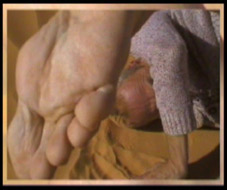
Pat Hillaire, Rolf Meesters
Dansent le désert
Art vidéo | s-vhs | couleur | 2:50 | France, Espagne | 2004
`Dansent le désert` Des paysages du corps se juxtaposent en images. Quelles danses sont possibles dans un tel environnement. C`est le défi que le désert pose aux danseurs. Créé par: Pat Hillaire Dansé par Rolf Meesters et Pat Hillaire Durée 2mn50
1998 initie un travail de vidéo-performance en présence de la danseuse Claudia Flammin puis de Rolf Meesters avec qui je commence en 2000 à expérimenter la danse. Dernière performance: octobre 2005 DA LI LI DA DA, Festival d?automne de Barcelone, 6 performers se réunissent pour expérimenter une performance oú l`important sera que chaque proposition aie la même intensité qu`une autre. Danse, poésie,vidéo, flute japonaise se fondent. En 2005 ont surtout lieu des performances de rue: bar opening exhibition, Festival de rue de Bcn, Museo Mares... 2003 à Berlin, ?KNOWHERE? 10 performances de rue, 3 performers,danseurs Rolf Meesters, Pat Hillaire, musicien sans instruments Johannes Bergmark. Celui-ci relève le défi de performer sans ses objets/instruments.
Baba Hillman
Catalogue : 2023Mary Bauermeister: Light and Stone | Film expérimental | super8 | couleur | 3:45 | Canada, France | 2022
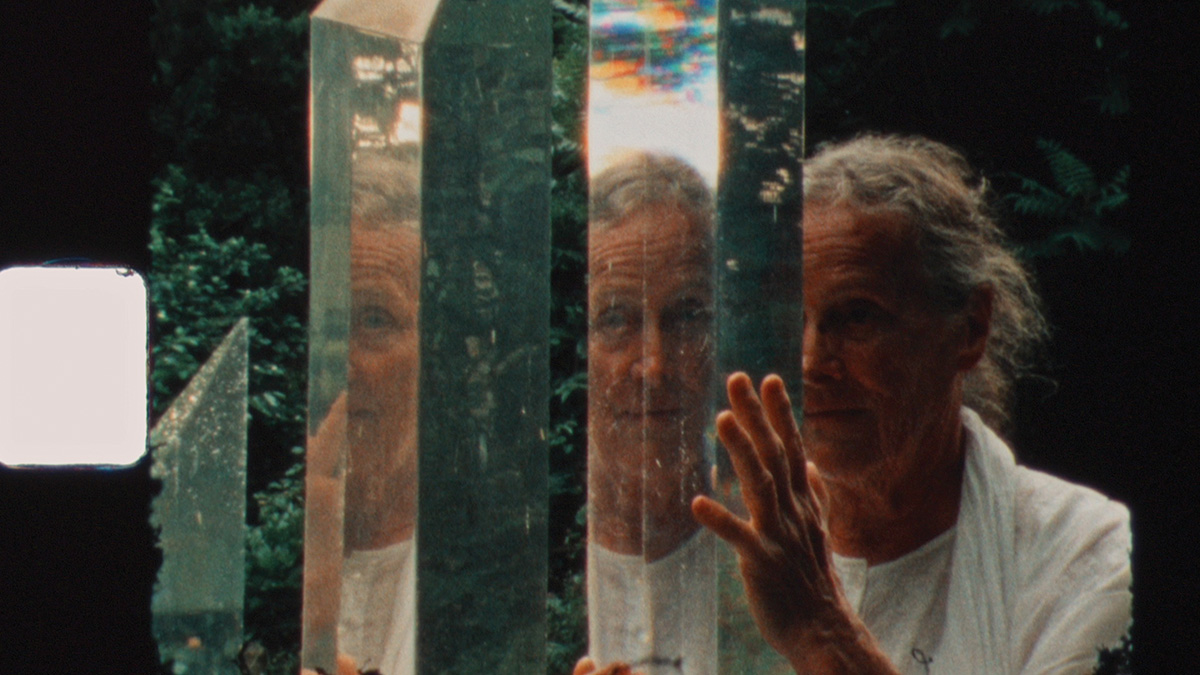
Baba Hillman
Mary Bauermeister: Light and Stone
Film expérimental | super8 | couleur | 3:45 | Canada, France | 2022
Remembering my last visit with Mary in her garden of light, trees, glass and stone.
Baba Hillman grew up in Japan, Venezuela and Panama and works between France and the U.S.. She received a B.A. in French Literature from Duke University and an M.F.A. in Film and Performance from the University of California, San Diego. Her films and performance works explore memory, history, perception and the poetics and politics of place, language, and the body. She was co-director of Teatro Movimento in Florence, studied with Etienne Decroux and Jean-Pierre Gorin, and is Professor Emerita of Film at Hampshire College in Amherst, Massachusetts. Her films have screened widely at festivals and museums including the Museum of Contemporary Art, Los Angeles, FIDMarseille, Edinburgh Film Festival, Rencontres Internationales Paris/Berlin, Ann Arbor Film Festival, National Gallery of Art, Washington D.C., Anthology Film Archives, ICAIC Havana, Africa World Documentary Festival, Yaounde, MIX Brazil, and European Media Art Festival, Osnabruck, among others. She has received awards and grants from the French Ministry of Culture, the Whiting Foundation, the California Arts Council, and the Italian city governments of Florence, Lecce and Certaldo. In 2020, Hillman’s film Kitâb al-Isfâr: Book of the Journey, a feature-length film about near-death and mystical experiences in Andalucia, premiered at the FIDMarseille film festival and was selected for the Athens Avant Garde Film Festival. Earlier films by Hillman include Decroux’s Garden, and 5 Cité de la Roquette, part of a series of films connected to return, place and disappearance.
Julien Hilmoine
Catalogue : 2006A chaque instant mourir | Fiction | 16mm | noir et blanc | 20:20 | France | 2005
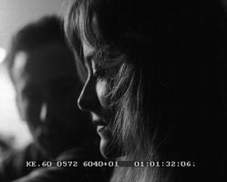
Julien Hilmoine
A chaque instant mourir
Fiction | 16mm | noir et blanc | 20:20 | France | 2005
Une jeune femme à fleur de peau, Agnès. Son meilleur ami, Camille. Sa compagne, Marianne. La soeur de cette dernière, Astrid. Ils devaient se retrouver tous les quatre, pour la première fois depuis longtemps. Mais Marianne ne vient finalement pas. Agnès part sentimentalement à la dérive. Deux nuits et un jour où vont ressurgir de vieilles histoires, des désirs neufs ou enfouis, et une complète remise en cause de leurs rapports à tous.
-Julien Hilmoine est né à Fécamp, en 1979. -Il a passé son enfance et son adolescence à Rouen, dans "une famille de moyenne bourgeoisie, laïque et républicaine". Après des études de lettres et un B.T.S. Audiovisuel option Image, il entre à la Fémis en département réalisation. -Il mène une jeunesse française classique : histoires d?amour, amitiés ; passions, ruptures ; morts. -Parisien par la force des choses, il déclare essayer de réaliser des films. Il avoue aimer les acteurs, passionnément et mène une quête permanente d?images, de visages, de voix.
Steve Hines
Catalogue : 2007Anyone | Vidéo expérimentale | dv | couleur | 2:11 | Royaume-Uni | 2006
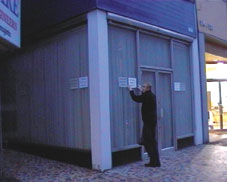
Steve Hines
Anyone
Vidéo expérimentale | dv | couleur | 2:11 | Royaume-Uni | 2006
Ce court métrage vidéo critique, parodie et renforce l'idée d'un Public Warning. Quelqu'un s'est emparé de la loi et a promis des poursuites judiciaires. On voit l'artiste, qui pourrait être n'importe qui, en train de défier et d'enfreindre la loi tout en la renforçant. Une planification minutieuse et une demande d'attention nous préparent à l'action en reproduisant la mise en garde, alors que la rapidité et l'humour sont utilisés pour la présentation et la mise en oeuvre de l'action.
Steve Hines a régulièrement exposé ces dix dernières années. Il a présenté son travail à un niveau national et international en participant à plusieurs festivals d'art interantionaux. Grâce à son expérience dans la photographie, la pratique de Steve Hines est solidement encrée dans cadre conceptuel à l'intérieur duquel il se sert de différents media pour travailler. Ceci lui offre une grande liberté et apporte constamment de nouveaux défis. Steve Hines aime réaliser des oeuvres conceptuelles minimales qui sont souvent combinées à la nature opposée, et pourtant complémentaire, des extrêmes. L'expérience personnelle et le quotidien l'inspirent et lui fournissent le matériau nécessaire à la création de son travail qui allie des récits à des éléments qui peuvent tous nous toucher.
Catalogue : 2006Speakers | Art vidéo | dv | couleur | 4:16 | Royaume-Uni | 2005
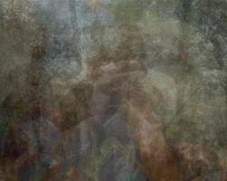
Steve Hines
Speakers
Art vidéo | dv | couleur | 4:16 | Royaume-Uni | 2005
"Speakers" représente la notion d'un monde troublé et compétitif où les nombreux pays, factions, religions et cultures essayent tous de communiquer et de persuader le reste du monde que leur manière d'agir ou leurs croyances sont supérieures. Le film est une image impressionniste en kaléidoscope, accompagnée d'un message audio chaotique. "Speakers" est un court-métrage tourné en vidéo digitale, et composé de plans tournés au Speakers Corner à Hyde Park, Londres. L'oeuvre finale représente la notion d'un monde troublé et compétitif où les nombreux pays, factions, religions et cultures, dont la plupart appartiennent à une minorité, essayent tous de communiquer et de persuader le reste du monde que leur manière d'agir ou leurs croyances sont supérieures. Les Speakers (orateurs) : un homme noir musulman ; trois hommes blancs différents débattant des idéaux du socialisme ; un homme noir chrétien ; une femme et cinq différents hommes blancs chrétiens ; deux hommes noirs parlant de leurs expériences personnelles ; et un pasteur américain. Ce sont tous des personnes exprimant leurs idées, leurs espoirs, leurs peurs et leurs inquiétudes quant aux problèmes qui nous affectent tous. Les scènes filmées de tous les "participants" s'enchaînent directement les unes à la suite des autres. Il en ressort un montage et un chaos confus d'images mouvantes et de mots. Cet effet et cette méthode reflètent les problèmes dans le monde et dressent des comparaisons à travers des arguments et des désaccords touchant aux questions des frontières, des pays, des religions, des gouvernements et régimes,… Dans sa version finale, "Speakers" inverse le rôle original entre le public et l'orateur d'une façon particulière. Initialement, c'était les orateurs qui luttaient, criaient et rivalisaient pour faire passer leur message à travers un public varié, composé de personnes doutant de ce qu'ils disaient, s'y intéressant ou même s'en moquant. A présent, dans l'espace d'un musée, c'est le public qui se tient là, intrigué par ce qui leur est présenté, et qui commence alors à écouter plus attentivement, essayant de comprendre ou d'entendre un mot distinct par-ci par-là, ou de visualiser un visage dans la foule. L'image évoque une sorte de peinture mouvante impressionniste de nature kaléidoscopique, tandis que le son évoque davantage celui d'un monde civilisé en pleine confusion, comme celui de la Bourse à une heure de grande activité par exemple.
Steve Hines expose ses oeuvres régulièrement depuis près de 10 ans. D'abord nationale, leur diffusion est devenue plus récemment internationale, notamment grâce à sa participation à plusieurs festivals d'art dans le monde entier. D'abord centré sur la photographie, le travail de Steve Hines est à présent profondément ancré dans un cadre conceptuel et ainsi il travaille avec divers moyens d'expression. Il s'intéresse à la réalisation d'oeuvres minimalistes et conceptuelles, souvent combinées avec la nature opposée et pourtant complémentaire d'extrêmes. Des expériences personnelles et le quotidien lui fournissent l'inspiration et le matériel nécessaire à la création d'oeuvres alliant récits et éléments pouvant tous nous affecter.
Gavin Hipkins
Catalogue : 2023Nature Writing | Vidéo expérimentale | mov | couleur et n&b | 9:48 | Nouvelle-Zélande | 2022
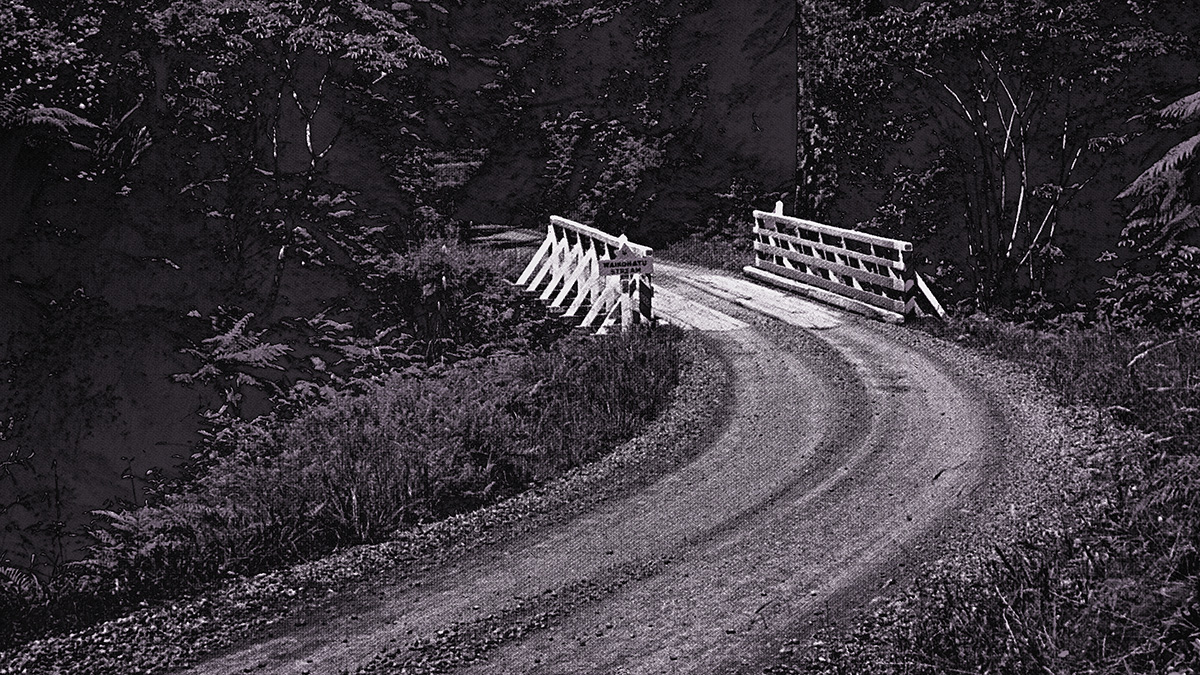
Gavin Hipkins
Nature Writing
Vidéo expérimentale | mov | couleur et n&b | 9:48 | Nouvelle-Zélande | 2022
Recorded at night with a humble camcorder over multiple excursions through indigenous and exotic flora, rhythmic observational studies chart real and imaginary wildernesses. Revisiting Thoreau’s Walden ideal, the sentimental appeal of taking an axe to the woods in white-settler colonies encounters postcolonial unease.
Gavin Hipkins (born 1968, Auckland, Aotearoa New Zealand) holds a Bachelor of Fine Arts from the University of Auckland and a Master of Fine Arts from the University of British Columbia, Vancouver. He is an Associate Professor of Fine Arts at Elam School of Fine Arts, the University of Auckland. His photography and moving image works interrogate how images create meaning through fragmentation and circulation. His work explores the nation state, particularly in colonised countries in an era of re-imagined communities and ideas of social and political utopia. His practice engages film as a cinematic art that blurs conventional genres of essay film, documentary and experimental narrative structures. Hipkins has exhibited widely in international exhibitions and film festivals including: CROSSROADS 2022, San Francisco Cinematheque (2022); Internationale Kurzfilmtage Winterthur, Switzerland (2021); 25FPS Festival, Zagreb (2020); Rencontres Internationales Paris/Berlin (2020); Videoex, Zurich (2019); The 9th Asia Pacific Triennial of Contemporary Art, Gallery of Modern Art, Brisbane (2018); International Film Festival Rotterdam (2018, 2015); International Short Film Festival Oberhausen (2017, 2016); The Jewish Museum, New York (2015); Edinburgh Art Festival (2014); Armory Film, New York (2012); Centre Pompidou, Paris (2011); Austrian Museum of Applied Art and Contemporary Art (MAK), Vienna, (2011).
Catalogue : 2020The Valley | Vidéo | hdv | couleur et n&b | 14:18 | Nouvelle-Zélande, Royaume-Uni | 2019
Gavin Hipkins
The Valley
Vidéo | hdv | couleur et n&b | 14:18 | Nouvelle-Zélande, Royaume-Uni | 2019
Devon’s moors are the backdrop for this hybrid film that constructs an imaginary community and frames sentiments of belonging at a time when parochialism and nationalism are globally prevailing. Inspired by Arthur Conan Doyle’s The Hound of the Baskervilles, Hipkins grafts portraits of his forebears across Devon?s uncanny landscapes. A subtext of Doyle’s classic novel negotiates yearnings for a homecoming and a mythical ancestral land.
Gavin Hipkins (b. 1968) is a New Zealand-based artist. He holds a Master of Fine Arts from the University of British Columbia. He is currently Associate Professor at Elam School of Fine Arts at the University of Auckland. His work explores the nation state, particularly in colonised countries in an era of re-imagined communities and ideas of social and political utopia. His recent moving image works engage film as a cinematic art that blurs conventional genres of essay film, documentary and experimental narrative structures. His work has been exhibited widely over the last two decades. His solo exhibition The Homely will open at the Museum of Contemporary Art Australia, Sydney in July 2020. Recent exhibitions and screenings include: Videoex, Switzerland (2019); 9th Asia Pacific Triennial of Contemporary Art, Gallery of Modern Art, Brisbane, Australia (2018); International Film Festival Rotterdam (2018, 2015); International Short Film Festival Oberhausen (2017, 2016); The Jewish Museum, New York (2015); Museum of Arts and Design (MAD), New York (2014); City Art Centre, Edinburgh Art Festival (2014); Armory Film, New York (2012); Centre Pompidou, Paris (2011); Austrian Museum of Applied Art and Contemporary Art (MAK), Vienna, (2011).
Nadia Hironaka, Matthew Suib
Catalogue : 2009The Soft Epic, or: Savages of the Pacific West | Art vidéo | dv | couleur | 3:6 | USA | 2008
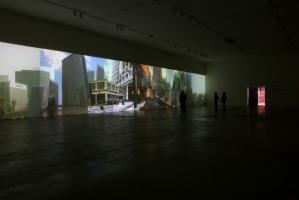
Nadia Hironaka, Matthew Suib
The Soft Epic, or: Savages of the Pacific West
Art vidéo | dv | couleur | 3:6 | USA | 2008
« The Soft Epic, or: Savages of the Pacific West » est une vidéo monumentale et une installation audio qui examine les représentations historiques et contemporaines de l'anxiété culturelle, et la relation fluide entre l'Histoire et le Cinéma, où réalité et fiction s?écroule l?une sur l'autre comme les plis d'un rideau de théâtre tiré. Composée de multiples projections et d?une bande son en surround ? nouvellement commandée à Bird Show (Ben Vida) ? l??uvre synthétise des images et des effets à partir de fresques historiques, d?épopées de science-fiction, de films de catastrophe et de peintures de Jérôme Bosch, en un paysage urbain fracturé et dystrophique, parsemé de flammes éternelles et de chimères. À travers la projection vidéo longue de cent pieds, la splendeur d?Hollywood usurpe le récit mythologique et historique au service de l'autorité politique et l'ordre social.
Nadia Hironaka réside actuellement à Philadelphie (USA) et est professeur au Maryland Institute College of Art. Elle a obtenu son MFA (Master of Fine Art) à l'Art Institute de Chicago (USA) et son BFA (Bachelor of Fine Art) à l'Université des Arts. En 2008, elle était membre du Pennsylvania Council on the Arts. Ses films et installations vidéo ont été montrés internationalement. Matthew Suib, artiste basé à Philadelphie, a exposé ses installations, vidéos, ?uvres audio, et photographies internationalement. En 2007, il a co-fondé Screening, avec Nadia Hironaka. Il est également membre du Pennsylvania Council on the Arts, et ancien membre de Vox Populi, un collectif d?artistes de Philadelphie.
Tzu Nyen Ho
Catalogue : 2008The Bohemian Rhapsody Project | Film expérimental | dv | couleur | 6:52 | Singapour | 2006
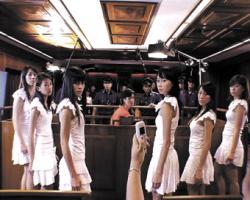
Tzu Nyen Ho
The Bohemian Rhapsody Project
Film expérimental | dv | couleur | 6:52 | Singapour | 2006
Le "Bohemian Rhapsody Project" est entièrement basé sur les paroles de la chanson de Queen, "Bohemian Rhapsody", et tourné à la cour suprême de Singapour. Un garçon est accusé, et son coeur est brisé à la vue de sa "mama" en larmes. Au cours des mois de juin et juillet 2006, il a fallu quatre tours d'auditions pour le rôle du personnage principal. La chanson de Queen, écrite en 1975, remplace la structure de la chanson pop de base (couplet-refrain-couplet), par un jeu de rôle multiple et un mélange quasi schizophrénique de styles musicaux différents. Sur les nombreux professionnels et non professionnels auditionnés, 22 ont été invités à un dernier tour d'audition qui s'est tenu dans une ancienne salle d'audience de l'hôtel de ville. Etaient présents des spectateurs spécialement invités, 18 autres membres du casting, ainsi qu'une équipe de film. Sur ces 22 auditionnés, 21 ont été sélectionnés pour le film final, composé uniquement de ces images d'audition. Le film qui en résulte, découpé sur la durée exacte de la chanson (5mn 52), fonctionne en même temps comme enregistrement de cette audition. De plus, le film, qui oscille entre texte parlé et texte chanté, est un moyen de solliciter la mémoire musicale des spectateurs et d'encourager leur participation à un exercice de karaoké mental.
Born in Singapore, Ho Tzu Nyen is a visual artist and filmmaker. His first project was Utama - Every Name in History is I (2003), a film and installation that has been shown in art exhibitions and film festivals such as the 26th Sao Paulo Biennale (2004); the 3rd Fukuoka Asian Art Triennale (2005), before being presented as a performance lecture at KunstenFESTIVALdesArts (2006). In 2005, he scripted and directed 4 x 4 ? Episodes of Singapore Art, a unique hybrid of the art documentary, video essay and drama that was broadcasted over 4 weeks on a public television channel in Singapore. It was last shown at ZKM, Germany (2007). In 2006, he was commissioned by the inaugural Singapore Biennale to produce The Bohemian Rhapsody Project, a film that has since been shown in film festivals such as the 53rd International Short Film Festival Oberhausen, and the 30th Clermont-Ferrand Film Festival. In 2007, he completed a short film called Reflections, based on a 19th Century parable by Lafcadio Hearn, which was exhibited in Zendai Shanghai Museum of Modern Art and the National Gallery of Poznan. Reflections will be shown in 2008 at the 54th International Short Film Festival Oberhausen and the 8th Jeonju International Short Film Festival. He is now making his first feature film, Here. In 2006/2007, he conceptualized and wrote the first and second parts of King Lear ? The Avoidance of Love, a live audition / film shoot / lecture / theatre performance, which he co-directed with Fran Borgia.
Jan Hoeft
Catalogue : 2015Exit Strategies | Vidéo | hdv | couleur | 18:0 | Allemagne | 2014
Jan Hoeft
Exit Strategies
Vidéo | hdv | couleur | 18:0 | Allemagne | 2014
In Exit Strategies an endless sequence of industrial fire escapes is shown. While somebody tells us how his life would change in case of a disaster, we see more and more examples of architecture that prepares us for the worst.
Jan Hoeft (b. 1981) is a visual artist based in Cologne. He was a researcher at the Jan Van Eyck Academy Maastricht in 2013/14. He is a graduate of the Academy of Media Arts Cologne and the Karlsruhe Institute of Technology.
Gerard Holthuis
Catalogue : 2006Careless Reef: 1. preface | Film expérimental | 16mm | noir et blanc | 3:50 | Pays-bas | 2004
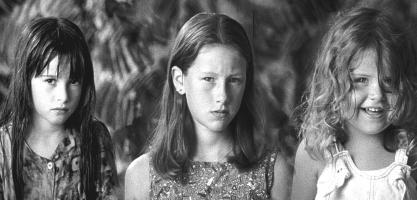
Gerard Holthuis
Careless Reef: 1. preface
Film expérimental | 16mm | noir et blanc | 3:50 | Pays-bas | 2004
"Preface" est un film sur notre vision des choses. Que voit-on dans un visage, et comment nous décodons ce que nous voyons. En introduction à "Careless reef", 6 films sur le monde sous la surface.
Gerard Holthuis est un cinéaste indépendant.
Kerstin Honeit
Catalogue : 2021[zi:lo]5 | Vidéo expérimentale | 4k | couleur | 17:17 | Allemagne, Canada | 2019
Kerstin Honeit
[zi:lo]5
Vidéo expérimentale | 4k | couleur | 17:17 | Allemagne, Canada | 2019
Le Silo 5, autrefois le plus grand grenier au monde, a été célébré par l'architecte Le Corbusier en 1927 en tant qu’aperçu d'une modernité utopique et d'un avenir esthétique de l'architecture. Depuis les années 90, le gigantesque complexe de silos de Montréal est une ruine industrielle, bien trop grande pour être démolie. Le grenier abandonné, devenu par la force des choses un monument à l'extractionnisme colonial global, marque, en tant que lieu de stockage, le point de départ de la pièce vidéo [zi:lo]5. L'œuvre aborde différents gestes et technologies de conservation et de collecte et, par conséquent - simultanément et indissociablement - des questions relatives aux notions d'écrasement, de suppression ou de réécriture. Sous l'angle d'un futur proche (et queer), les collections s'exposent comme des accumulations de lacunes et d'omissions. Ces vides deviennent des corps résonnants ayant le potentiel d'ouvrir des espaces à d'autres pratiques de stockage intermédiaire.
Kerstin Honeit a étudié les beaux-arts et la scénographie à la Kunsthochschule Berlin Weissensee (Allemagne). Elle vit à Berlin (Allemagne) et enseigne l'art médiatique à la Hochschule für Grafik und Buchkunst Leipzig (Allemagne). Dans sa pratique en tant qu'artiste et réalisatrice, elle travaille à l’intersection de différentes formes de mise en scène. Sa recherche artistique se concentre sur l'étude des mécanismes de représentation dans la production de mondes d'images hégémoniques, notamment en relation avec les modes de traduction culturels et linguistiques dans le contexte des images en mouvement. Depuis 2006, elle a présenté son travail dans plusieurs expositions et festivals, notamment: La Centrale galerie Powerhouse, Montréal (Canada); HMKV – Hartware MedienKunstVerein, Dortmund (Allemagne); São Paulo International Short Film Festival, São Paulo (Brésil); Ruhrtriennale, Bochum (Allemagne); Kunsthalle Rostock, Rostock (Allemagne); Neuer Berliner Kunstverein, Berlin (Allemagne); OFF Biennale Cairo, Le Caire (Égypte); Videoart at Midnight, Berlin (Allemagne); MMOMA - Moscow Museum of Modern Art, Moscou (Russie); Schwules Museum, Berlin (Allemagne); Fajr International Film Festival, Téhéran (Iran); HKW – Haus der Kulturent der Welt, Berlin (Allemagne); Internationale Kurzfilmtage, Oberhausen (Allemagne); SixtyEight Art Institute, Copenhague (Danemark); Berlinische Galerie, Berlin (Allemagne); Les Complices*, Zurich (Suisse); Videonale, Bonn (Allemagne); Gallery 400, Chicago (USA); CCNY – Camera Club of New York (USA); Arsenal - Institut für Film und Videokunst, Berlin (Allemagne).
Catalogue : 2018My Castle Your Castle | Doc. expérimental | hdv | couleur | 14:47 | Allemagne | 2017
Kerstin Honeit
My Castle Your Castle
Doc. expérimental | hdv | couleur | 14:47 | Allemagne | 2017
my castle your castle Set up as a somewhat retro TV talk show my castle your castle operates from within the skeleton of the Prussian castle that is currently being re-built in the center of Berlin. Erected on the foundations of the dismantled GDR parliament building called Palace of the Republic, the castle is not only an imperialist architectural remake, in its future function as exhibition space for the “ Ethnographic Collections ” of Berlins National Museums it literally embodies Germany’s legacies of colonial violence. The video engages with the building site as a stage for the material and social construction “ as well as the queer contestation ” of “ nation ” and (white) “ masculinity”: Interviewed by a talk show host over a piece of cake from porcelain dishes with reproductions of the castle and its disappeared counterpart, two construction workers evoke an opaque third in a language of structural matter. Peter Friedrich had supervised the construction (1973-76) of the Palast der Republik, and Gunter Teichert worked as the head of its deconstruction (2006-08). In the matter of fact conversation between the “ makers of the palace ”, their body of work “ in other words architecture, political representation, memory ” disintegrates in the builder’s jargon. However, the material and machinic vocabulary of construction site itself resonates the massive urban reconstructions, redistributions of properties and redefinitions of political meaning through architecture that have followed the disappearance of state socialisms in Europe. This vocabulary is emphasized and queered in short interludes to the talk show in which the talk show host, who is performed by the artist Kerstin Honeit herself incorporating elements of drag, appears sitting on a huge excavating machine or between metal poles that stabilize casts for concrete. (Text by Suza Husse)
Kerstin Honeit was born in Berlin, where she still lives and works. She studied Fine Art and Theatre Design at the Kunsthochschule Weissensee in Berlin. Since 2014 Honeit has been teaching at the Kunsthochschule Kassel (künstlerische Mitarbeiterin, class of Bjørn Melhus). Using video works, performance and installations in her artistic research, Honeit examines worlds of hegemonic image production in the media of information technology and pop culture. Intervening at the boundaries of representation and reception, she questions the construction of social norms. Her recent work has been shown at Berlinische Galerie - Museum of Modern Art, Haohaus Taipei, Stuttgarter Filmwinter - Festival for Expanded Media, Bärenzwinger Berlin, SixtyEight Art Institute Copenhagen, Kunstverein Leipzig, International Short Film Festival Oberhausen, Arsenal - Institut für Film u. Videokunst Berlin, Monitoring Dokumentarfilm- u. Videofest Kassel, Neuer Berliner Kunstverein, Videonale.15 Kunstmuseum Bonn, Les Complices* Zurich, Gallery 400 Chicago, CCNY New York, Site Gallery Sheffield.
Mike Hoolboom
Mike Hoolboom
Catalogue : 2008Fascination | Vidéo expérimentale | dv | couleur et n&b | 70:0 | Canada | 2006
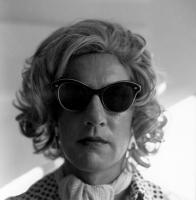
Mike Hoolboom
Fascination
Vidéo expérimentale | dv | couleur et n&b | 70:0 | Canada | 2006
Artiste majeur de la scène canadienne des années 70, Collin Campbell, maître du "drag" dans ses vidéos, était un provocateur du genre. Bien plus qu`un simple portrait d`un artiste et de son époque, le film est une réflexion captivante sur le désir d`images et sur l`emprise qu`exercent celles-ci. Mike Hoolboom cinéaste expérimental prolifique et passionnant nous livre ici un film à la narration innovante et d`une exceptionnelle beauté. Mais "Fascination" est avant tout un film sur vous...
Mike Hoolbloom est un vidéaste et réalisateur canadien, souvent considéré comme l'un des réalisateurs expérimentaux les plus talentueux de sa génération. Il est l'auteur de deux livres : "Plague Years" (1998) et "Fringe Film in Canada" (2001). Co-fondateur du collectif de programmation Pleasure Dome, il a été directeur artistique du Images Festival et coordinateur de la section cinéma expérimental du Canadian Filmmakers Distribution Centre. Il a remporté plus de trente récompenses internationales. Ses ?uvres ont notamment été présentées au Musée d'Art Moderne, au Centre Pompidou et dans des festivals majeurs. Neuf retrospectives lui ont été consacrées, la dernière à Buenos Aires.
Mike Hoolboom, Alena Koroleva
Catalogue : 2021Wax Museum | Vidéo expérimentale | mov | couleur | 11:0 | Canada, Russie | 2020
Mike Hoolboom, Alena Koroleva
Wax Museum
Vidéo expérimentale | mov | couleur | 11:0 | Canada, Russie | 2020
Dans une suite de 15 scènes, la plupart se passant dans un seul plan d'ensemble, l'héroïne russe renégocie son pacte avec le capitalisme russe, et avec les nouveaux corps et relations qu'il a rendus possibles. Tourné à Saint-Pétersbourg au cours d'un automne ensoleillé, alors que nos visages pouvaient encore supporter l’ancienne lumière.
Alena Koroleva est d’origine russe. Elle est artiste et curatrice multidisciplinaire. Co-fondatrice du Kinodot Experimental Film Festival, St-Pétersbourg (Russie), elle a créé quelques films courts et œuvres sonores. Mike Hoolboom réalise des films et écrit.
Catalogue : 2020I Touched Her Legs Remix | Vidéo | hdv | couleur et n&b | 0:0 | Canada | 2019
Mike Hoolboom
I Touched Her Legs Remix
Vidéo | hdv | couleur et n&b | 0:0 | Canada | 2019
Eva Marie Rodbro’s embedded ethnographic maestro short, originally made in Brownsville, Texas in 2010, is given a fan remake. Night vision animal life and teen hangouts conjure a temporary and fragile collective, while conversation fragments, alternately performed and raw, shouted and whispered, collide.
Mike Hoolboom began making movies in 1980. Making as practice, a daily application. Ongoing remixology. Since 2000 there has been a steady drip of found footage bio docs. The animating question of community: how can I help you? Interviews with media artists for 3 decades. Monographs and books, written, edited, co-edited. Local ecologies. Volunteerism. Opening the door.
Catalogue : 20193 Dreams of Horses | Vidéo | 16mm | couleur et n&b | 5:30 | Canada, 0 | 2018
Mike Hoolboom
3 Dreams of Horses
Vidéo | 16mm | couleur et n&b | 5:30 | Canada, 0 | 2018
Film is made out of gelatin that comes from horses. They’re waiting to be slaughtered, so that pictures can be made.
Mike Hoolboom is a Canadian media artist and writer.
Mike Hoolboom
Catalogue : 2017Spectator | Film expérimental | super8 | couleur | 6:0 | Canada | 2017
Mike Hoolboom
Spectator
Film expérimental | super8 | couleur | 6:0 | Canada | 2017
Is it the oldest dream? Giving birth to my father. Shot on a single starry afternoon.
Mike Hoolboom is a Canadian media artist living in Toronto.
Mike Hoolboom
Catalogue : 2018Nursing history | Film expérimental | hdv | noir et blanc | 4:0 | Canada | 2017
Mike Hoolboom
Nursing history
Film expérimental | hdv | noir et blanc | 4:0 | Canada | 2017
.
Mike Hoolboom is a Canadian artist working in film and video. He has made over eighty films and videos, though most have been withdrawn from circulation, approximately a dozen remain on view. His work has appeared in over four hundred festivals, garnering thirty awards. He has been granted the Tom Berner Award for community service and two lifetime achievement awards, the first from the city of Toronto, and the second from the Mediawave Festival in Hungary. He has enjoyed retrospectives of his work at the Images Festival (Toronto), Visions du Reel (Switzerland), Xenix (Switzerland), Cork International Festival (Ireland), Cinema de Balie (Amsterdam), Mediawave Festival (Hungary), Impakt Festival (Holland), Vila do Conde Festival (Portugal), Jihlava Documentary Festival (Czech Republic), Stuttgarter Filmwinter (Germany), Musée des Beaux-Arts de Caen (France), Sixpack Film (Vienna), the Buenos Aires International Festival (Argentina), Pacific Cinematheque (Canada) and A Million Different Loves Festival in Poland.
Catalogue : 2016Scrapbook | Doc. expérimental | 16mm | noir et blanc | 18:0 | Canada | 2015
Mike Hoolboom
Scrapbook
Doc. expérimental | 16mm | noir et blanc | 18:0 | Canada | 2015
Lensed in Ohio’s Broadview Developmental Center in 1967 by secret camera genius and audio visual healer Jeffrey Paull, Scrapbook tells the story of audacious autistic Donna Washington in her own words, as she encounters pictures of one of her former selves fifty years later.
Born: Korean War, the pill, hydrogen bomb, playboy mansion. 1980s: Film emulsion fetish and diary salvos. Schooling at the Funnel: collective avant-geek cine utopia. 1990s: experimentalist features, transgressive psychodramas, questions of nationalism. 2000s: Seroconversion cyborg (life after death), film-to-video transcode: feature-length-found-footage bios. Fringe media archaeologist: copyleft author 7 books, co/editor 12 books. Curator: 30 programs + www.fringeonline.ca Occasional employments: artistic director Images Fest, fringe distribution Canadian Filmmakers. 80 film/vids, most redacted. 10 features. 70 awards, 15 international retrospectives. 3 lifetime achievement awards. www.mikehoolboom.com
Catalogue : 2006Public lighting | Doc. expérimental | dv | couleur et n&b | 76:0 | Canada | 2004
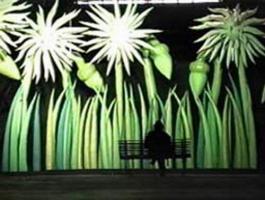
Mike Hoolboom
Public lighting
Doc. expérimental | dv | couleur et n&b | 76:0 | Canada | 2004
« Public Lighting est une méditation sur la photographie et la création d'images, qui peuvent capturer, remplacer nos expériences, et leur survivre. Le film est divisé en 7 parties. Chaque chapitre est une étude de cas, de différents types de personnalités identifiés par le jeune auteur, qui nous guide dans le prologue. Le premier, homme gay, nous emmène faire la tournée des bars et des restaurants, où il a vécu des ruptures amoureuses. Il nous raconte sur le mode ironique ses histoires avec ses ex amants. Un hommage à Philipp Glass est suivi, de manière plutôt incongrue, par Hey Madonna, lettre de confession adressée à la chanteuse par l'un de ses fans, séropositif. Amy célèbre un autre anniversaire, mais avoue qu?elle n?a aucun souvenir de ce qu?elle voit à la télévision. Ceci dit, au moins elle a une caméra : "Je prends des images non pour m?aider à me souvenir, mais pour enregistrer mes oublis" . Hiro vit sa vie à distance, et s'aventure rarement au-delà de l'objectif. Un jeune mannequin anxieux raconte des événements poignants de son passé. Peu de réalisateurs se réapproprient le footage de manière aussi forte : à la fois drôles et incisives, ces images nous ramènent à des parties de nous-mêmes. Le travail récent de Mike Hoolboom a une telle empathie avec la condition humaine qu'il nous parle directement au c?ur. » Mark Webber, London film festival
Mike Hoolboom vit et travaille à Toronto, vidéaste et cinéaste, il a aussi écrit plusieurs livres, dont Plague Years en 1998, et Fringe Film in Canada en 2001. Il est membre fondateur du collectif Pleasure Dome, et a travaillé comme directeur artistique de l?Images Festival et dans le comité de direction de Canadian Filmmakers Distribution, pour le cinéma expérimental. Son travail a été montré notamment au festival de Berlin, de Rotterdam, de Locarno. Il a eu plusieurs rétrospectives dans huit grandes villes européennes.
Mike Hoolboom
Catalogue : 2021Wax Museum | Vidéo expérimentale | mov | couleur | 11:0 | Canada, Russie | 2020
Mike Hoolboom, Alena Koroleva
Wax Museum
Vidéo expérimentale | mov | couleur | 11:0 | Canada, Russie | 2020
Dans une suite de 15 scènes, la plupart se passant dans un seul plan d'ensemble, l'héroïne russe renégocie son pacte avec le capitalisme russe, et avec les nouveaux corps et relations qu'il a rendus possibles. Tourné à Saint-Pétersbourg au cours d'un automne ensoleillé, alors que nos visages pouvaient encore supporter l’ancienne lumière.
Alena Koroleva est d’origine russe. Elle est artiste et curatrice multidisciplinaire. Co-fondatrice du Kinodot Experimental Film Festival, St-Pétersbourg (Russie), elle a créé quelques films courts et œuvres sonores. Mike Hoolboom réalise des films et écrit.
Catalogue : 2020I Touched Her Legs Remix | Vidéo | hdv | couleur et n&b | 0:0 | Canada | 2019
Mike Hoolboom
I Touched Her Legs Remix
Vidéo | hdv | couleur et n&b | 0:0 | Canada | 2019
Eva Marie Rodbro’s embedded ethnographic maestro short, originally made in Brownsville, Texas in 2010, is given a fan remake. Night vision animal life and teen hangouts conjure a temporary and fragile collective, while conversation fragments, alternately performed and raw, shouted and whispered, collide.
Mike Hoolboom began making movies in 1980. Making as practice, a daily application. Ongoing remixology. Since 2000 there has been a steady drip of found footage bio docs. The animating question of community: how can I help you? Interviews with media artists for 3 decades. Monographs and books, written, edited, co-edited. Local ecologies. Volunteerism. Opening the door.
Catalogue : 20193 Dreams of Horses | Vidéo | 16mm | couleur et n&b | 5:30 | Canada, 0 | 2018
Mike Hoolboom
3 Dreams of Horses
Vidéo | 16mm | couleur et n&b | 5:30 | Canada, 0 | 2018
Film is made out of gelatin that comes from horses. They’re waiting to be slaughtered, so that pictures can be made.
Mike Hoolboom is a Canadian media artist and writer.
Devin Horan
Catalogue : 2012Late and Deep | Fiction expérimentale | dv | couleur | 16:44 | USA, Norvège | 2011
Devin Horan
Late and Deep
Fiction expérimentale | dv | couleur | 16:44 | USA, Norvège | 2011
Dark north. Beneath an expanse of sky, a night of flesh absorbed in fever.
Devin Horan was born 1982 in the United States. He got his diploma in Art History from Columbia University in New York City. He also worked for Lithuanian film-maker Sharunas Bartas on the film Eastern Drift as a camera assistant. ?Boundary? is his first film.
Catalogue : 2011BOUNDARY | Doc. expérimental | dv | couleur | 16:46 | USA, Lettonie | 2009
Devin Horan
BOUNDARY
Doc. expérimental | dv | couleur | 16:46 | USA, Lettonie | 2009
Set among an isolated community in a remote landscape near the Russian border, BOUNDARY evokes a space of ambiguity, a psychogeography, an absence of personal histories. It is the first installment in a tetralogy of films based on a statement by Sadeq Hedayat: ?In life it is possible to become angelic, human, or animal. I have become none of these things.?
Born 1982 in the United States. Graduated in Art History from Columbia University in New York City. Worked for Lithuanian film-maker Sharunas Bartas on the film Eastern Drift (Indigene d`Eurasie) as a camera assistant. BOUNDARY is his first film.
(la) Horde
Catalogue : 2020Cultes | Vidéo | 4k | couleur | 15:0 | France | 2019
(la) Horde
Cultes
Vidéo | 4k | couleur | 15:0 | France | 2019
Puissants terrains d’expérimentation, les corps se trouvent au cœur du nouveau film de (LA)HORDE, Cultes, imaginé comme une réflexion autour du phénoméne des festivals. "Peut-on encore vivre une expérience spirituelle dans ces nouveaux sanctuaires consuméristes ? Les spectateurs réussissent-ils à créer leur propre expérience subversive comme autant d'individus constituant une masse ?". Le film est un trip hallucine? au cœur d’une foule, d’une communaute? de corps soudés par leur amour de la musique, des corps qui dansent mais qui n’oublient jamais de ressentir.